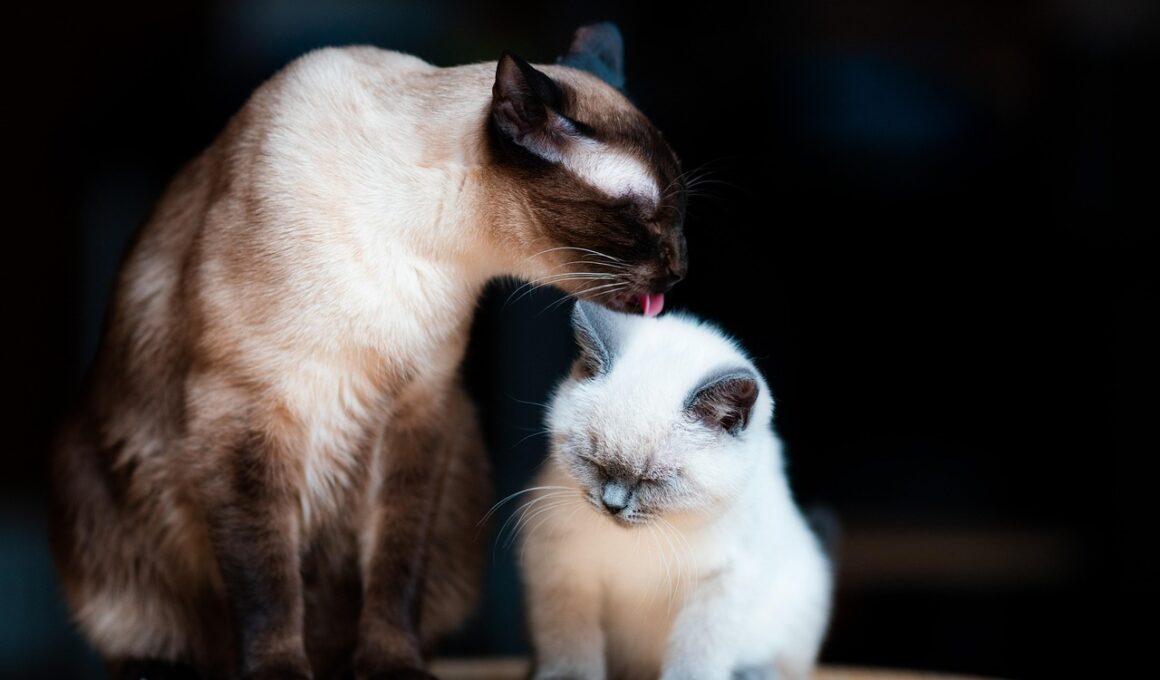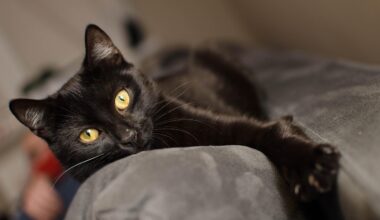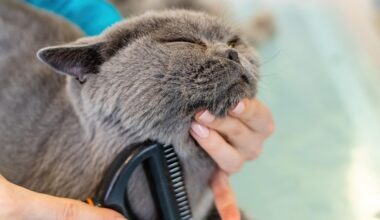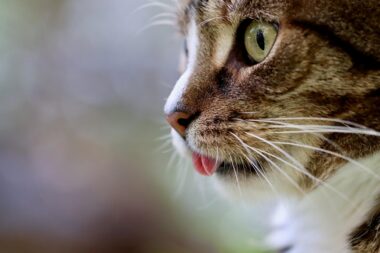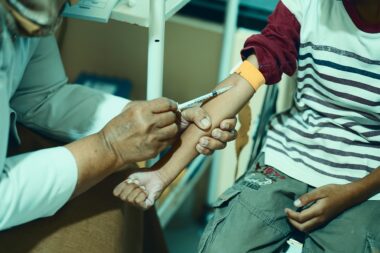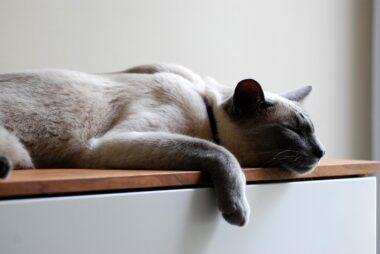Keeping Your Cat’s Environment Stress-Free Post-Vaccination
After your cat receives its vaccination, it’s essential to provide a calm and comfortable environment. Cats often feel stressed after such medical procedures, so creating a safe space can be beneficial. Begin by ensuring that your home is quiet and peaceful. Avoid loud noises, as this can heighten your cat’s anxiety. Providing a familiar blanket or toy can also help your furry friend feel more secure. Set up a designated area with their favorite items. You may consider limiting their exploration to one part of the house where they feel most comfortable. During this time, monitor their behavior closely. Signs of stress may vary, but it’s crucial to identify and address them. Maintain a routine during their recovery period. Feed them at the same times, and keep their litter box clean and accessible. Frequent cutting of nails can help too. Anything to ease their discomfort is a good idea. Making sure your cat doesn’t over-exert itself is crucial during recovery. Allow them plenty of rest in a cozy, warm area to help soothe their nerves.
After vaccination, some cats might experience mild side effects. It’s essential to be observant during this period. Symptoms can include lethargy, slight fever, or a decreased appetite. While these are usually normal reactions, any concerning symptoms should prompt a consultation with a veterinarian. Keeping the vet’s contact details handy can be beneficial for quick reference, especially if something seems off. Additionally, while your cat may be feeling unwell, ensure it has access to food and water at all times. You can encourage eating by offering their favorite foods. Different types of food might pique their interest more than regular offerings. Keep their water dish fresh and clean, replacing the water daily. Hydration is crucial for recovery. If your cat refuses to eat for over 24 hours, contact your vet as soon as possible to rule out any complications. As your furry friend starts feeling better, gradually reintroduce normal activities. Monitor its playtime and interactions with other pets to avoid overstimulation. Overall, the focus should be on providing comfort while ensuring a safe atmosphere as they recover.
Creating a Safe and Comfortable Space
A primary approach in post-vaccination care is making your cat’s environment visually pleasing yet secure. You can use cat trees or soft beds in a designated recovery corner for your feline to retreat to. Allow plenty of hiding spots within their space, as this can significantly decrease anxiety. Some cats prefer enclosed spaces, such as a cardboard box lined with soft fabric. Consider limiting high activity areas where your cat typically roams freely. Ensure that the environmental temperature is comfortable, neither too hot nor too cold, as this can affect how they feel. An essential aspect of this is maintaining cleanliness; ensure the environment is tidy to encourage relaxation. Unwanted dirt can stir discomfort, exacerbating their stress post-vaccination. Similarly, keep their litter box in an accessible yet quiet area. Plastic cat beds can also be moved around for variety, should your cat wish to explore slightly beyond their comfort zone. Try to introduce safe toys that don’t require too much energy. Following this careful arrangement will lead to a noticeable improvement in your cat’s post-vaccination mood.
Another fundamental aspect to consider during this time is the emotional support your presence provides. Spend more time with your cat, offering gentle affection and encouragement. Cats often take comfort from gentle petting or simply having you nearby. Speak softly and reassuringly to alleviate anxiety while they recover. This bond is vital in helping them cope with after-vaccination stress. Being attentive can also help you identify any unusual behavior. If your cat seems to prefer isolation, respect this, but check on them regularly. Create a relaxing atmosphere by playing calm music, which may help soothe them. Avoid strict rules, allowing your cat to set its own pace during this recovery stage. If you practice patience, observing your pet’s unique needs will assist in creating a stress-free environment. Engaging with toys that require light interaction can mitigate boredom without requiring physical exertion. Monitor continually for signs of improvement, as this can also uplift their mood significantly. Pay attention when they return to their playful nature, which is a promising sign of a gradual return to normality.
Nutrition and Hydration Post-Vaccination
Nutrition plays a significant role during your cat’s post-vaccination recovery phase. It’s crucial to continue offering a high-quality diet that may help boost their immune system. If they are reluctant to eat, tempt them with softer foods that are easier to chew, or hand-feed them to increase their interest. You could try adding warm water or broth to dry kibble to entice them further. Providing adequate hydration is equally important. Ensure that your cat is drinking enough water, as some may avoid drinking when feeling unwell. Keep their water bowl fresh and topped up at all times. In addition, incorporating wet food into their diet may help ensure proper hydration levels. Observe slight changes in their appetite as minor deviations can lead to concern. Your cat requires optimum nutrients to recover swiftly. Consulting your veterinarian about dietary recommendations can provide insights specific to your cat’s needs, particularly if there are underlying health concerns. Keeping track of feeding behavior during this period is vital, as weight loss can become a significant issue if not managed carefully during recovery.
Following a vaccination, regular observations can help gauge your cat’s overall health status. Look out for any distinct behavioral changes that might arise. For instance, an uptick in hiding or diminished enthusiasm for play are signs that your feline might still be feeling some discomfort. Maintain a shared diary documenting daily occurrences and track their condition. Any unexpected developments can be promptly relayed to your vet, providing valuable insight into your cat’s recovery journey. It’s beneficial to schedule a follow-up appointment, ensuring no adverse reactions arise. This follow-up allows you to have insights from a professional perspective while confirming that your cat’s health progresses as expected. Stress reduction strategies must be consistent; consider scheduling lighter activities, playdates with a familiar friend or gentle toys. However, be prepared to allow your cat ample space. The combination of attentive healthcare and nurturing companionship fosters resilience during their recovery phase, paving the way for a healthy, joyful return to normal playfulness. Prompt veterinary assistance can make a real difference if concerning signs persist.
Reducing Environmental Stressors
In a home environment, minimizing potential stressors is crucial for your cat’s recovery. First, assess noise levels; sudden sounds can evoke anxiety and agitation in your pet. If you reside in a bustling area, consider setting up cozy calming spots far from the commotion. Covering windows with curtains may help block out too much external activity. Secondly, consider the feline companions in your home. Conflicts among pets can lead to additional stress, so ensure there’s adequate separate space for each animal. It may help to rotate introductions gradually during recovery. Be proactive about managing their interactions. Avoiding new pet introductions is also wise during this sensitive time. Thirdly, ensure that indoor temperatures remain comfortable. If your home tends to be particularly hot or cold, provide soft blankets for additional comfort. Sometimes, positioning a heating pad on a mild setting (with caution) can provide soothing warmth without causing harm. Maintain a routine of calming activities, such as gentle brushing or petting, to further ease your cat during this recuperative phase.
Lastly, always remember that patience is key in this period. Cats respond differently to vaccinations, and some may take longer to bounce back. Provide a consistent routine, allowing your cat to feel secure. Engage with them during their recovery phase while respecting their boundaries. How you respond during this time can shape their long-term behavior towards vet visits and medical care. A positive association is vital, and your actions will convey to your cat that these experiences, while uncomfortable, lead to improved health and wellbeing. Ensure an optimized approach enables them to recover healthily and happily. Keep monitoring their behavior as they heal, and notice patterns that encourage a smoother transition into regular activities post-recovery. If you have any questions or concerns, don’t hesitate to reach out to your veterinarian. This collaboration not only aids in your cat’s betterment but builds a supportive network. The right balance of understanding, affection, and care will lead to enhanced resilience, not just for this vaccination, but also for future health requirements. Ultimately, stress management becomes an essential element in ensuring your cat leads a happy, healthy life after vaccinations.
